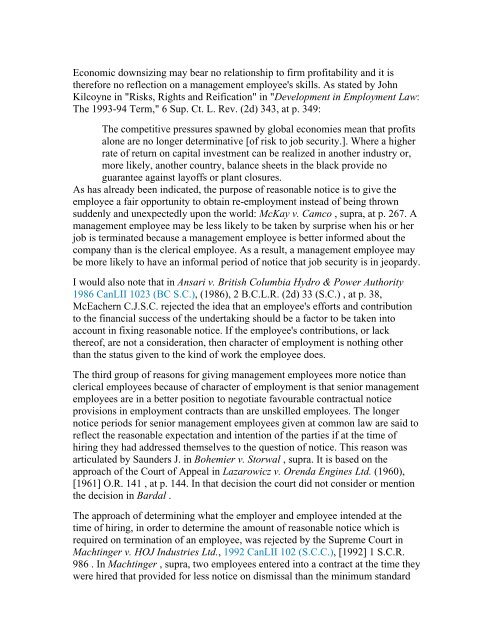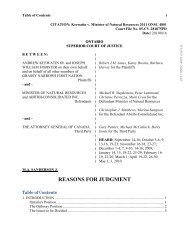Cronk v. Canadian General Insurance Co., 1995 CanLII 814 (ON CA)
Cronk v. Canadian General Insurance Co., 1995 CanLII 814 (ON CA)
Cronk v. Canadian General Insurance Co., 1995 CanLII 814 (ON CA)
You also want an ePaper? Increase the reach of your titles
YUMPU automatically turns print PDFs into web optimized ePapers that Google loves.
Economic downsizing may bear no relationship to firm profitability and it is<br />
therefore no reflection on a management employee's skills. As stated by John<br />
Kilcoyne in "Risks, Rights and Reification" in "Development in Employment Law:<br />
The 1993-94 Term," 6 Sup. Ct. L. Rev. (2d) 343, at p. 349:<br />
The competitive pressures spawned by global economies mean that profits<br />
alone are no longer determinative [of risk to job security.]. Where a higher<br />
rate of return on capital investment can be realized in another industry or,<br />
more likely, another country, balance sheets in the black provide no<br />
guarantee against layoffs or plant closures.<br />
As has already been indicated, the purpose of reasonable notice is to give the<br />
employee a fair opportunity to obtain re-employment instead of being thrown<br />
suddenly and unexpectedly upon the world: McKay v. Camco , supra, at p. 267. A<br />
management employee may be less likely to be taken by surprise when his or her<br />
job is terminated because a management employee is better informed about the<br />
company than is the clerical employee. As a result, a management employee may<br />
be more likely to have an informal period of notice that job security is in jeopardy.<br />
I would also note that in Ansari v. British <strong>Co</strong>lumbia Hydro & Power Authority<br />
1986 <strong>CanLII</strong> 1023 (BC S.C.), (1986), 2 B.C.L.R. (2d) 33 (S.C.) , at p. 38,<br />
McEachern C.J.S.C. rejected the idea that an employee's efforts and contribution<br />
to the financial success of the undertaking should be a factor to be taken into<br />
account in fixing reasonable notice. If the employee's contributions, or lack<br />
thereof, are not a consideration, then character of employment is nothing other<br />
than the status given to the kind of work the employee does.<br />
The third group of reasons for giving management employees more notice than<br />
clerical employees because of character of employment is that senior management<br />
employees are in a better position to negotiate favourable contractual notice<br />
provisions in employment contracts than are unskilled employees. The longer<br />
notice periods for senior management employees given at common law are said to<br />
reflect the reasonable expectation and intention of the parties if at the time of<br />
hiring they had addressed themselves to the question of notice. This reason was<br />
articulated by Saunders J. in Bohemier v. Storwal , supra. It is based on the<br />
approach of the <strong>Co</strong>urt of Appeal in Lazarowicz v. Orenda Engines Ltd. (1960),<br />
[1961] O.R. 141 , at p. 144. In that decision the court did not consider or mention<br />
the decision in Bardal .<br />
The approach of determining what the employer and employee intended at the<br />
time of hiring, in order to determine the amount of reasonable notice which is<br />
required on termination of an employee, was rejected by the Supreme <strong>Co</strong>urt in<br />
Machtinger v. HOJ Industries Ltd., 1992 <strong>CanLII</strong> 102 (S.C.C.), [1992] 1 S.C.R.<br />
986 . In Machtinger , supra, two employees entered into a contract at the time they<br />
were hired that provided for less notice on dismissal than the minimum standard
















